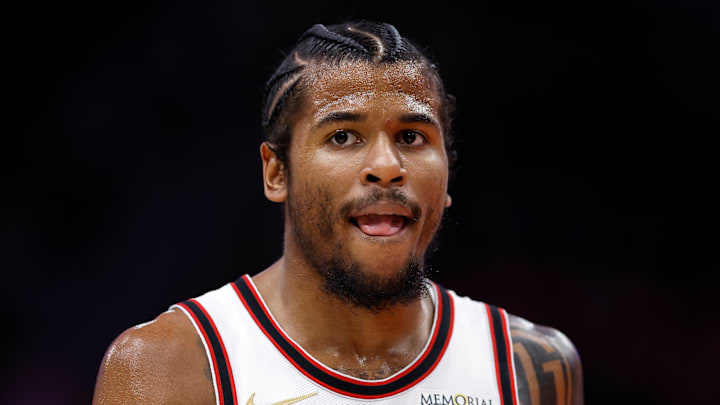The Houston Rockets paid Jalen Green a contract designed to trade him. Now the Golden State Warriors are trying to do the same thing with Jonathan Kuminga -- and it has caused a roadblock that neither side knows how to get across.
The Warriors and Kuminga have been locked in off-and-on contract negotiations for weeks, and it has ground everything else in NBA free agency to a halt. There is a line of players waiting to sign with Golden State who have to wait on Kuminga, and it appears other teams waiting on other free agents are also stuck in suspended animation.
Jonathan Kuminga wants to be paid like a star, but while he is capable of scoring in massive bursts, he hasn't put together the other aspects of being a winning player to give confidence to either Golden State or other teams that they should go all-in on paying him.
That has led the Warriors to prioritize signing Kuminga to a tradeable contract. They want him to accept a two-year deal with a second-year team option, and then also he will need to waive his implicit no-trade clause. In other words, they are demanding the most trade-friendly contract possible. This would not be a contract designed to extend his time as a part of Golden State and their franchise, but rather a placeholder so they can trade him during the season when the base year compensation rules lift and it is easier to trade him.
This "sign-to-trade" approach was already used by another Western Conference team, one that the Warriors are quite familiar with -- and to great effect. Mike Dunleavy and company appear to be taking a page out of the Houston Rockets' playbook.
The Warriors are trying to copy the Rockets
Last fall, the Houston Rockets went down to the wire negotiating rookie contract extensions with their two members of the 2021 NBA Draft, No. 2 pick Jalen Green and mid-round pick Alperen Sengun. To that point, Sengun had shown more despite his lower draft pedigree, but Houston didn't just pay both the maximum that they could pay despite their production and promise.
They negotiated actual contract short of the maximum amount, and there was an obvious goal in mind for Jalen Green's contract: it was very tradeable. While Green had blossomed into a solid NBA scorer, his game in other ways had not come around yet -- defense, passing, decision-making, motor. The Rockets were not prepared to commit to Green as a centerpiece of their team moving forward, but he had the production to demand a legitimate contract in restricted free agency.
The two sides compromised on a short-term contract that paid Green enough for him to sign the extension ahead of restricted free agency but would not prevent the Rockets from trading him this offseason. The deal was a three-year, $106 million contract with a player option, a so-called "2+1" deal that was the first of its kind for such a large number.
The Rockets were indeed able to then use Green's contract as matching salary this summer, sending him to Phoenix as a part of the return for Kevin Durant. The deal was not so large, nor so long, as to make the swap negative salary, even though Green's trajectory stayed the same: lots of scoring, flashes of potential, not enough winning basketball. Warriors coaches will likely tell you he was the primary reason the Rockets lost their first-round series to Golden State this past spring.
This brings us back to Kuminga. He did not agree to a contract extension ahead of restricted free agency, and he proceeded to have a lower-quality version of the season that Jalen Green just had: scoring, flashes of more, not enough winning basketball. That puts him at a lower level in contract negotiations. Add in the Warriors' very real financial limitations and Kuminga is struggling to get anything in a new deal. The offer they have made is disrespectful, yes, but they have the leverage to do so.
Golden State wants to sign Kuminga to a contract they know they can trade in six months. Jonathan Kuminga wants to sign a contract that will pay him what he thinks he deserves -- but he doesn't have the leverage to get it. He needs to find his way to the right short-term deal to set him up for a larger payday down the road -- but thanks to the Rockets, that will be an even more difficult task.
